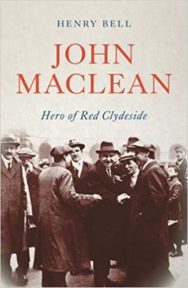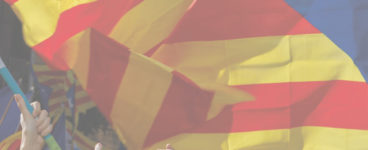‘I am not here, then, as the accused; I am here as the accuser of capitalism dripping with blood from head to foot’
John Maclean, the socialist, internationalist campaigner—celebrated by Lenin and Trotsky—was once named ‘the most dangerous man in Britain’ by British Military Intelligence. His campaigning for peace and prosperity for the working classes cost him his teaching job and saw him imprisoned and force fed while on hunger strike. His principles saw him oppose the First World War and support Irish and Scottish independence, and, when he died, thousands of people lined the streets of Glasgow to see his funeral procession pass. In his new book, Henry Bell explores the events that shaped the man and his politics, as well as Maclean’s social and cultural legacy. Here, Bell writes for BooksfromScotland on why John Maclean’s life and work is as relevant as it’s ever been.
John Maclean: Hero of Red Clydeside
By Henry Bell
Published by Pluto Press
Naomi Mitchison wrote that the great tragic myth of Scotland was that of the rebel king who died for his people: Christ at Calvary, Wallace at the Tower of London, and John Maclean in the capitalists’ jail at Peterhead. The self-sacrificing rebel who stands up for right and justice has a near-universal appeal: an inherent nobility, combined with a useful inability to argue with those that come after.
Many movements have claimed John Maclean since his death, from the Communist Party of Great Britain to the Scottish National Party. Maclean casts a long shadow over modern Scotland, and yet his writings are little read and his political beliefs not widely known. Many Glaswegians are more likely to think Maclean is the hero of Die Hard than the hero of Red Clydeside. The lack of knowledge about a man who was once Britain’s most famous revolutionary, the most dangerous man in the country, and the celebrated comrade of Lenin and Trotsky, may in part be explained by Maclean’s lifetime of rebellion. Whether in his fight against the British state or the communist leadership, Maclean refused to compromise any of his values. George Lansbury wrote in Maclean’s obituary:
Had he been able to see his way to stand in with the rest of us there is no position he could not have filled: but he followed the light of his conscience wherever it led him.
John Maclean’s earliest political experiences were defined by the poverty of his childhood. By the time he was 18, his father and three of his siblings had died. The remaining family lived in two rooms in Pollokshaws. There Maclean heard his mother and grandmother’s stories of how they had been driven from their home in the highlands by the greed of landlords. When Maclean’s friends in the Southside of Glasgow convinced him to read the works of Karl Marx he found suddenly a philosophy that explained the suffering of those around him, and, more than that, proposed a cure. When he read Capital in 1900, he paid particular attention to Marx’s lines on the highland clearances:
The “clearing” made by the Duchess of Sutherland will suffice here… All their villages were destroyed and burnt, all their fields turned into pasturage. British soldiers enforced this eviction, and came to blows with the inhabitants. One old woman was burnt to death in the flames of the hut, which she refused to leave. Thus this fine lady appropriated 794,000 acres of land that had from time immemorial belonged to the clan.
Maclean saw in Marxism a way to understand the world around him, the history and the future of the Scottish working class. He joined the nascent British Socialist Party and began his work as a Marxist lecturer and pamphleteer.
But even within the British Socialist Party Maclean could not help but rebel. When the party’s leadership supported the government in building up the army to defend against German expansion, Maclean was clear that his loyalty was not to his party or his country, but to the international working class. He told the people of Scotland that:
The men they were asked to shoot were their brothers, with the same difficulty on Saturdays to find rent for their miserable dwellings, who had to suffer the same insults and impertinence from their gaffers and foremen … What did it matter if they looked a little different? And spoke a different language?… their real enemy was the employers, and that as long as turning lathes, ploughs, looms, ships – all the tools of wealth production – were possessed by a small class of privileged people, then so long they would be slaves. To get free from this slavery was their real concern… The victory of Socialism must be world-wide.
Maclean campaigned fiercely against the First World War and his actions were recognised in London and in Moscow. The workers in Russia made him honorary president of the Soviet along with Lenin and Trotsky, and the British Government had him arrested and tried for sedition. In the dock Maclean made his most famous speech. He refused to plead innocent or guilty, and instead told the court that he rejected the justice of the ruling class, and appealed only to the working class:
I am a socialist, and have been fighting and will fight for an absolute reconstruction of society for the benefit of all. I am proud of my conduct. I have squared my conduct with my intellect, and if everyone had done so this war would not have taken place. I act square and clean for my principles. I have nothing to retract. I have nothing to be ashamed of. Your class position is against my class position. There are two classes of morality. There is the working class morality and there is the capitalist class morality.
He was sentenced to hard labour, jailed, and force fed. But within a year public pressure was so great that the government agreed to release Maclean. He arrived back in Glasgow fighting for communism, independence and a free Ireland, and battling against the Labour party from within. He told the workers that if they must, they should vote for ‘pink Labour’, but that what was needed was a red revolution. He was seen by many as an extremist, but he never lost the support of the most oppressed sections of Scottish society.
Maclean rebelled against the war, the state, and the Scottish and British left: seeing in all of them a failure to deliver the people from exploitation and oppression. He was the consummate rebel, unable to accept any compromise, though willing to fight, as he put it, for any palliative that would improve the lives of the workers on their way to revolution. In his memorial to Maclean, Edwin Morgan wrote:
Failures may be interesting, but it is the firmness
of what he wanted and did not want
that raises eyebrows; when does the quixotic
begin to gel, begin to impress, at what point
of naked surprise?
… Maclean was not naive, but
“We are out
for life and all that life can give us”
was what he said, that’s what he said.
And that is the truth, Maclean was out for everything. He didn’t want reform or compromise, his rebellion was to secure life and all that it can give to the workers of Scotland and the world.
Henry Bell will be joined by James Kelman and others on December 1st at Stereo in Glasgow for a Maclean Centenary event.
https://www.stereocafebar.com/events/2018-12-01-john-maclean-centenary-living-rent-benefit-stereo
‘John Maclean: Hero of Red Clydeside’ by Henry Bell is published by Pluto Press, priced £14.99
ALSO IN THIS ISSUE

 It’s Only the End of the World
It’s Only the End of the World
‘“I owe you an explanation?” The boy’s eyes were like saucers. “When did my mum turn into Jackie Cha …














